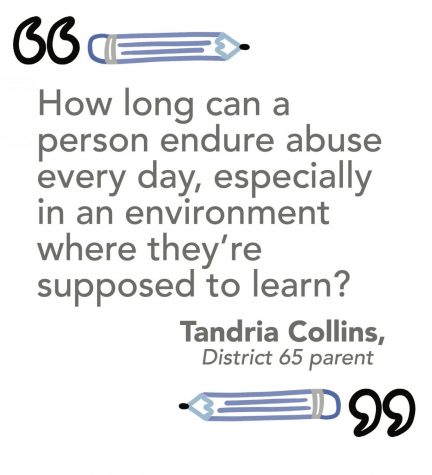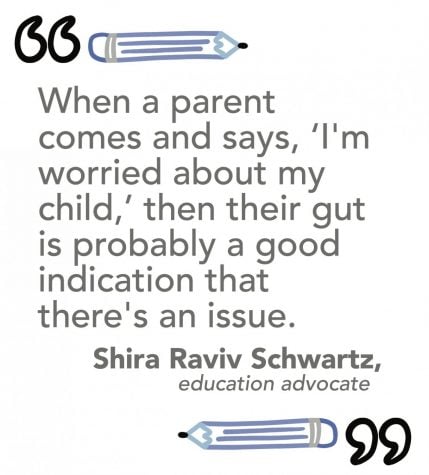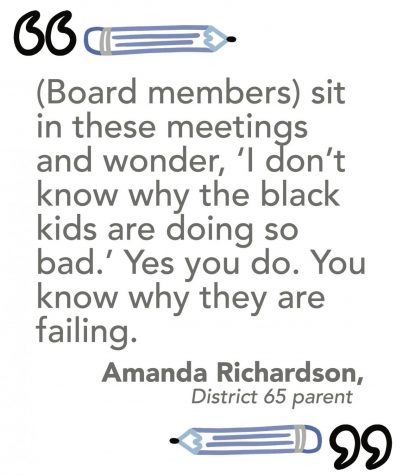In Focus: Parents of students with disabilities say Evanston schools are failing to support their children
May 30, 2019
In January, Tandria Collins got a call from her daughter, an eighth-grader at Haven Middle School. She was hiding in a school bathroom after girls approached her wanting to fight. Her daughter Chayce had her hood pulled over her hair so “no one would try to pull it if they fought” as she cried to her mom over FaceTime. Later that day, boys from Haven followed her home, taunting and harassing her throughout the walk.
Collins immediately alerted school administrators to these incidents and made note of her daughter’s Individualized Education Program, or IEP, a plan that outlines accommodations for students with disabilities in public schools. Their response was to move some of Chayce’s bullies to another lunch period, Collins said, but the children still went to the same lunch hour and threatened to fight her. She said she isn’t aware if any disciplinary actions were taken against the children involved.
“As a student with an IEP, the district has a clear and direct responsibility to help her succeed,” Collins said. “This did not happen. There was no safety plan discussed, there was no counsel, there was no assistance with getting her missed work completed. She was allowed to express things that happened, but there was never any consequences given.”
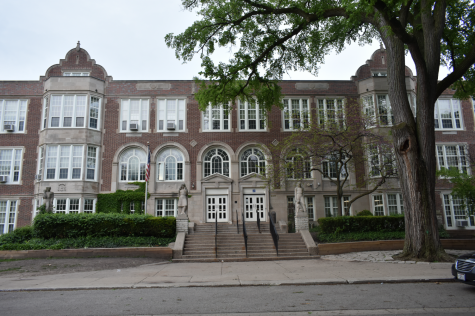
Haven Middle School, 2417 Prairie Ave.
Collins said her daughter has gotten obscene phone calls and Instagram messages from male classmates, been made fun of because of her disability, as well as been harassed and called names repeatedly.
The bullying and inaction continued for three months until Collins decided to withdraw her daughter from Haven in early March. Collins said she believed her daughter was no longer safe at school.
Because she was frequently in the school office or having her mom pick her up for fear of her safety, Chayce missed a lot of class and found it difficult to focus on schoolwork. She began the year as an honor roll student, but by the time she left Haven, she was getting C’s and D’s.
“How long can a person endure abuse every day, especially in an environment where they’re supposed to learn?” Collins said.
Her case is not unique across Evanston/Skokie School District 65 or Evanston Township High School/District 202. Both districts provide special education services, but parents, students and professionals interviewed by The Daily say the schools are failing to meet students’ needs.
Families have come forward to detail their experiences in the districts, speaking with professionals and confiding in one another. In Facebook groups and community meetings, they shared stories unique to their children and schools, but one concern unites them all: the disconnect between students’ needs and the services they receive.
While both districts release yearly special education enrollment numbers, only District 65 provides a breakdown of suspension data for general and special education students.
But the problems in both districts go beyond the numbers. Because each student’s condition is unique, it is difficult to quantify how administrators and staff members address their needs. It’s only possible to see the complexity of the situation through the individual stories of students and their family members.
Grading the districts
Every student who is enrolled in special education programs or receives related services in public schools is required to have an IEP. These plans are uniquely designed to fit the needs of each student, taking into consideration their academic achievement and functional performance.
In the process of developing an IEP, a group of teachers, parents and experts pool knowledge and experience to determine a child’s individual needs. These plans are reassessed and adjusted yearly.
But in District 202 and District 65, parents, students and professionals say IEPs are not being followed, parent input is being ignored and students with IEPs are not receiving the accommodations they need.
Despite months of calling, emailing and meeting with the district, Collins said the school administration failed to protect her daughter from harassment and refused to provide extra support in her classes.
Matt Cohen, a Chicago-based special education attorney who has worked cases in both districts, said the relationship between educators, supervisors and parents does not always function seamlessly. As a result, District 65 and District 202 parents are often excluded from conversations or given incomplete information. Overall, Cohen said he would give the two school districts a grade of C- for their special education programs.
He attributes many of the districts’ challenges to a lack of training and research-based curricula for teachers, which are often provided to them without “real depth.” Many schools are also pushing for “inclusive” classrooms — mixed classes with general and special education students — but often, this results in fewer resources for everyone.
“They don’t have enough resources in either the regular or self-contained classes. They are quick to discipline kids,” Cohen said. “There’s disproportionate discipline occurring and it seems that the relationships with parents are difficult.”
Misguided discipline
When Scott Hays sums up his sophomore year of high school, the first word that comes to mind is “horrible.”
Scott, who will be attending Oakton Community College in the fall, was a part of the special education program at Evanston Township High School. He is on the autism spectrum and received accommodations to account for his condition, like getting reminders to write down assignments and helping to minimize distractions by restricting his laptop access.
Accommodations like Scott’s are provided in accordance with his IEP. Once a student is given an IEP — and corresponding “label” that denotes their condition — plans are determined based on their needs. Scott’s mother, Michele Hays, said he has been receiving special education assistance since elementary school, but the transition to ETHS was still rocky.
“You get a label and then you have to navigate (school) with that label,” Hays said. “Whether that label fits or not, it’s kind of what you’re stuck with, and it’s not necessarily the school trying to figure out who you are and how to meet your needs.”
Scott said he was taking challenging classes his first year and not getting the support he needed to do well. By the time he was a sophomore, Scott had two citations on his disciplinary record, the punishments for which were directly connected to his disability, Hays said.
He frequently watched first-person shooter video game clips on YouTube and would adopt violent language he heard in them. Using that language during class journaling exercises as well as watching the gaming videos on school computers got him in trouble with teachers and staff.
This behavior was explained in Scott’s IEP, and his mother said she sent letters to teachers and staff detailing the nuances of her son’s behavior. Still, Scott found himself being disciplined, often by school administrators who weren’t trained in dealing with IEPs, Hays said.
During his sophomore year, Scott was sent to the hospital twice for expressing what the school deemed suicidal language and ideations. His stays in the partial hospitalization program — a form of outpatient psychiatric care — were recorded as disciplinary actions, Hays said.
Hays said she was kept out of the loop during most of the disciplinary process, and that if she had been allowed in the room with her son and the IEP team at ETHS, she would have been able to communicate that much of Scott’s behavior was due to his condition.
Last February, Hays filed a complaint with the Office for Civil Rights in the U.S. Education Department, detailing the disciplinary actions ETHS took against her son. In April 2018, OCR ruled in favor of ETHS, stating that because the school had disciplined students in general education for the same behavior as Scott, it was an indication that they did not discriminate against children with disabilities in this case.
ETHS officials declined to comment for this story.
Cohen said evidence shows traditional school discipline is not effective for most students — particularly for those with disabilities. According to the National Association of School Psychologists, traditional “punitive” or “zero-tolerance” disciplinary policies have proven counterproductive and ineffective for all students. Instead, the association recommends positive intervention, including relationship-building within schools and positive reinforcement.
Despite findings like these, Cohen said school officials across the district still enforce regular discipline, in-school suspension and out-of-school suspension.
In addition to their IEPs, many special education students also have individualized behavior plans put together by their schools, said Cari Levin, the founder and director of Evanston CASE, a special education advocacy nonprofit. Evanston CASE works closely with parents from both Evanston school districts and hosts meetings for parents of students with IEPs to share their experiences.
Behavior plans help guide effective interventions, Levin said — particularly in terms of discipline — for each student based on their needs.
These plans are meant to ensure disciplinary actions taken against students consider that certain behavior might be a result of their conditions, and should be addressed differently than if the student were in general education.
“When you’re focusing on disability, (there) is really a need for staff training and a need for clarity and policy so that people understand that there needs to be specific consideration of the impact of their disability on the behavior,” Levin said.
In Scott’s case, this could have meant no suspension, no trips to the hospital, as well as a better understanding from ETHS as to what would have been an appropriate reaction to his behavior.
Left on the sideline
Shira Raviv Schwartz is an education advocate who works in the Chicago area to help families speak up for their children and get accommodations. In many of the cases she works on in Evanston, she said the system doesn’t allow parents to intervene in or prevent issues that arise with their children’s IEPs early on.
Many students don’t exhibit all the “traditional” signs and needs of the label listed on their IEP. For example, they might be receiving good grades but have unaddressed social needs — so their overall success may be overestimated by teachers and administrators with whom they have limited individual interaction.
“Some kids are in a gray area … where one area’s lower than the other, but they perform well or they look like they’re performing well,” Raviv Schwartz said. “And so it is hard to tell sometimes. But when a parent comes and says, ‘I’m worried about my child,’ then their gut is probably a good indication that there’s an issue.”
She said improved communication with parents and preventative intervention from both districts would help alleviate part of the disconnect between the students and the school.
Often, families are unaware of some aspects of the IEP process, and what kinds of accommodations they can get for their children, Raviv Schwartz said. Because of this, parents can become bystanders in conversations about their children’s needs.
“A lot of times, when you’re sitting in a meeting like that, you’re anxious, you’re worried, you’re emotional,” Raviv Schwartz said. “And when you have those kinds of feelings, sometimes you miss things.”
Greater parental involvement could be a step forward in improving the situations for many students across both districts, Raviv Schwartz and Cohen added. And in districts struggling to get funding and resources, working more closely with parents would mean that teachers and administrators can get the most complete picture of a student’s needs.
Cohen and Evanston CASE have teamed up for events catered to parents of special education students, which are designed to allow them to share their experiences in a group, trade advice and ask Cohen questions. In an April 10 event, held at Curt’s Café South in Evanston, Cohen spoke to a group of over a dozen parents about discipline and behavior management.
At the meeting, he said parents are often seen — not heard — in the decision-making processes.
“There needs to be an overhaul in the attitude about working with parents, because in both districts, I think there’s a lot of conflict and hostility towards parents,” Cohen said. “That actually hurts the kids and the teachers, because it means that problems become bigger instead of being resolved.”
While some students’ needs are more visible to teachers and administrators, other students have “invisible disabilities” that manifest in more internalized struggles, rather than academic or social ones.
An ETHS student’s mother said her daughter has anxiety, and some of the accommodations she gets include breaking down longer-term assignments and the ability to leave class to see a social worker if she feels the need. The Daily is not identifying the mother and daughter for privacy reasons.
The mother said her daughter’s condition isn’t immediately apparent and she is not quick to voice her own needs. She said teachers and administrators would spend a bulk of the IEP meetings focusing on her daughters’ successes, while taking little time to address her difficulties in school and with her IEP. She said ETHS assumes her daughter isn’t struggling to the level she actually is because she doesn’t vocalize her needs and is in good academic standing.
She said she feels “dismissed” as a parent, and that the school is assuming it understands her daughter’s needs based on a limited set of parameters. Cohen said this disconnect comes from the rigidity of both districts’ ways of problem-solving.
“I think a lot of the middle managers in District 65, particularly, and the case managers in District 202 have been directed or taught to use very narrow parameters for what kids can get with little ability to be flexible or problem solve to meet individual needs,” Cohen said. “So the result is that they’re kind of programmed to say no, (not) to solve problems.”
He added that some families — especially those who are white or wealthy — can afford to make up for the lack of resources and access extra help for their children, including evaluations for IEPs, tutoring or therapy.
“All of those extra diagnostic and therapy services are also important in helping parents to more effectively advocate for their children,” Cohen said. “Poor families and black families are also at a disadvantage in terms of the ability to advocate for adequate support… That leads to the special ed classrooms being even more segregated.”
Racial disparities
Parents in District 65 are also demanding administrators stop disregarding students’ IEPs and address their needs adequately. Black parents have expressed frustration that their concerns are not being heard, which has led to disruptions in their children’s education.
Black parents who have students with IEPs in the district say their cases have generally been mismanaged and many feel their specific concerns are further compounded because of their race.
For one mother in District 65, these struggles have resulted in attempts to get her fifth-grade son transferred out of school. Administrators said her son needed an IEP, a decision she said was a way for them to justify the school’s mistreatment. The Daily is not identifying the mother and son for privacy reasons.
The mother said school officials are also pressuring her to put her son on ADHD medication despite him having tested negative for the disorder.
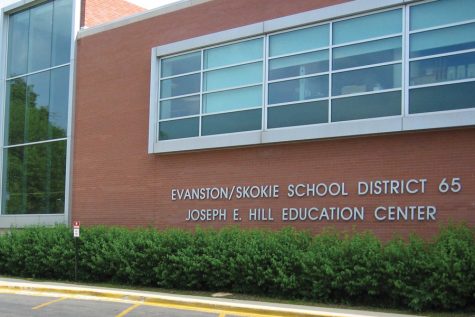
The Joseph E. Hill Education Center, 1500 McDaniel Ave.
“None of these people are medically certified to diagnose him but they’re already diagnosing him and treating him as such,” she said.
When the mother asked one of his teachers why her son was being more harshly punished than his peers, the teacher responded: “He does things to get on my nerves.” She said she rarely got specific answers about what her son was doing wrong.
The mother recounted an incident one of her son’s teachers pulled a desk out from under him, injuring him. She said her son’s teacher told him that if he went to the school nurse, he would not be allowed back in her classroom. No one filed an incident report and the mother said she was only notified of the occurrence after a call from the school nurse.
Her son never went back to that teacher’s class.
She said she brought these issues to the district. She said she and her son were asked her to sign a social contract, stating that if her son misbehaved that he would be barred from participating in a school trip. She was banned from the school when she refused.
Joyce Bartz, District 65’s assistant superintendent of special services, said in a statement to The Daily that the district’s educators and special services staff work closely with families to ensure they are “providing students with a range of supports to best serve their academic and social/emotional needs.” Over 900 students in District 65 receive special education services and she said that the district goes “to great lengths to ensure that students are receiving everything that they need to be successful in the classroom and in life.”
Bartz added that families should work closely with their child’s teachers and IEP team to develop solutions if the student’s needs aren’t being met. But Cohen said it can be harder for some parents to come forward about their children’s needs, and to advocate on their behalf for fear of unwanted repercussions.
“I think some parents are fearful that their kids will be stigmatized or segregated,” Cohen said. “And my experience is that particularly African-American families are even more worried about that, because they have more reason to fear that their kids will be segregated for reasons that are based on their race and not based on their needs.”
Systemic inaction
The District 65 mother said she isn’t the only black parent who has been banned from school grounds after confronting administrators about their shortfalls. She said these interactions are representative of a culture in District 65 officials of “not caring about black parents or students.”
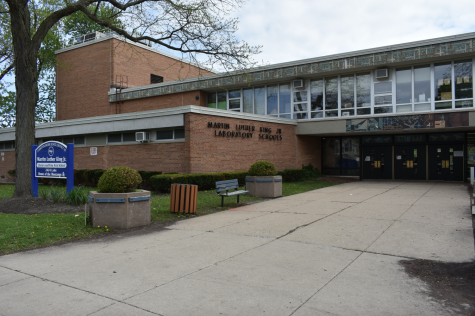
Dr. Martin Luther King Jr. Literary and Fine Arts School, 2424 Lake St.
“If I could ask them a question it would be, ‘Is my son being targeted for an IEP and bad behavior because he’s black?’” she said.
In a statement, Bartz said District 65 has made racial equity “a priority.”
“We recognize that institutional racism and implicit bias play a part in the public education system and District 65 is no different,” she wrote. “Yet, we are taking very important steps through our equity agenda and various professional learning opportunities to build staff capacity in discussing and addressing issues related to race.”
Other black parents have also raised concerns about schools ignoring their children’s IEP guidelines. Amanda Richardson said the school administration has failed to provide her daughter with adequate support, causing her to fall behind her peers. Her daughter is a sixth grader at Dr. Martin Luther King Jr. Literary and Fine Arts School but only tests at a first or second grade level in math.
Richardson’s daughter is one of many black students at King Arts who are struggling academically. In January, test scores revealed an opportunity gap between black students and their white peers.
Data showed that no black students in the third, fifth, sixth and seventh grades met college readiness benchmarks in math or reading in the latest Measures of Academic Progress testing results. For Richardson’s daughter, the intersection of her race and disability have resulted in an even larger opportunity gap.
Richardson said she has asked the school repeatedly to help her daughter, but after four months of phone calls and emails to school faculty and staff, they only agreed to give her daughter limited time for special education services and meetings with a social worker during the next school year. She said this doesn’t go far enough.
Richardson added that she herself doesn’t understand what these accommodations really mean because the language in the IEP is “vague.” She brought these concerns to district officials who told her to request another IEP meeting — which school faculty then denied.
Those conversations would have allowed her to further explain the importance of her demands, she said. Her only option now is to find a pro bono tutor to help her daughter to try and catch up over the summer.
Because of the district’s inaction, Richardson decided to go to a District 65 board meeting on May 20 to publicly voice her demands.
“(Board members) sit in these meetings and … wonder, ‘I don’t know why the black kids are doing so bad,’” Richardson said during public comment. “Yes, you do. You know why they are failing… and you are refusing to do anything about it.”
Richardson said she stayed until the end of the meeting and for a while after, but no one from the board approached her about the concerns.
‘It takes partnership’
Because every student and parent has individual needs and accommodations, it’s hard to find a uniform path forward: What might be a solution for one student could do nothing to help another.
Parents throughout both districts are looking for other ways to get their students the accommodations they need to be successful. Some families turn to Evanston CASE for informational workshops, counseling and training for parent advocacy. Others are searching for legal routes to address their issues.
Cohen, Levin and Raviv Schwartz all emphasized the need for parental involvement, further educator training and a more open dialogue to improve special education in both districts. Cohen added that while there are small changes parents can make to improve their individual situations, a culture change needs to occur for all students to have their needs met.
“These issues, if they were easy to solve, everybody would be solving them,” Raviv Schwartz said. “These are really hard and tricky to figure out, so it takes flexibility. It takes partnership and collaboration in order to form a strong plan and move a kid forward.”
Parents want their opinions to be considered during IEP meetings and in developing and adjusting these plans throughout the year. In instances when parents have tried to advocate for their children, they have been ignored or, in some cases, barred from the school, actively restricting their agency in their children’s educations.
When a student is given an IEP, their accommodations vary — from help in regular classes to self-contained classrooms with other special education students to specialized therapeutic day schools. Ideally, the range of the needs and accommodations listed on an IEP would determine how a student is placed in one or a combination of these services.
ETHS recently announced plans to open a special education day school ahead of the 2019-2020 school year. Located at 1233 Hartrey Ave., the new school is expected to receive 20 students next fall, who all have more severe behavioral or emotional needs. Placements into the school are decided by an IEP team. When determining if a student is a right fit, ETHS officials will consider a student’s level of functioning, goals and accommodations needed, as well as other factors.
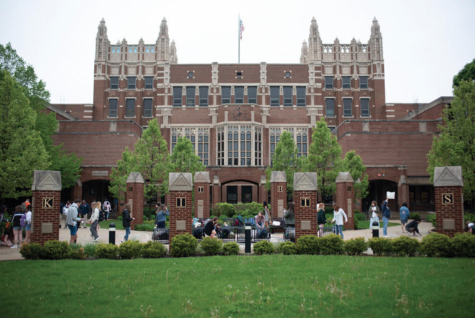
Evanston Township High School, 1600 Dodge Ave.
In theory, Cohen said the school could help students — and provide them a closer, more accessible place to receive the accommodations they need — but he said he is worried about low staffing numbers and the ratio of teachers and mental health professionals to students. Students in the school will be coming in with widely differing accommodations and all need to learn together, under one roof.
“I’m fearful that in order to make the budget for the alternative school work, the high school is going to put a lot of kids into the one school who may not be the right match with that school, but really require a different type of specialization,” Cohen said. “And by virtue of all the kids being lumped together when they don’t really all fit, that could end up shortchanging some of the kids and creating a very bad mix.”
Within the District 65 and District 202 schools themselves, some students have better experiences than others. After his “horrible” sophomore year, Scott and his mother sat down with his IEP team and devised a plan for his last two years of high school. His grades went up, his social life improved and at the end of his senior year, he received an award for excellence in special education. Scott will graduate from ETHS this spring before heading to Oakton. Things are looking up.
But not everyone is that fortunate.
Since Chayce left Haven, she has been taking online courses in an attempt to keep her on track with her peers. In the fall, Chayce will start at ETHS, and her mother said she hopes her daughter’s situation gets better — the family isn’t in the position to move out of Evanston or pay for extra services themselves.
Collins said she moved to Evanston because it has a reputation for being diverse and inclusive. She was drawn to the strong public school system but didn’t foresee the challenges she would face when her daughter received an IEP.
“We got a yard and got a little puppy and we thought life would be great,” Collins said, “but it’s not great at all.”
Email: [email protected]
Twitter: @juliaesparza10
Email: [email protected]
Twitter: @kristinakarisch


